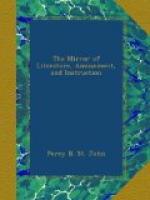waged between the countries since that remote era,
none of them were attended with such success as to
lead to a permanent occupation of the island.
The islanders, proud of an unconquered name, and gratified
to recollect that they originally gave a king to England,
not England a king to them, have been always distinguished
for fidelity to the British government; and their
unshaken loyalty has, from time to time, been rewarded
by immunities and privileges, highly conducive to
their prosperity, and calculated to foster that spirit
of nationality, which is invariably distinctive of
a free people. They are exempted from those taxes
which press heaviest on the English yeoman, and from
naval and military service beyond the boundaries of
their own island. The local administration of
justice is still regulated by the old Norman code
of laws, and this circumstance is regarded by the
natives as a virtual recognition of their independence;
but strangers, when they inadvertently get involved
in legal disputes, have often cause to regret its
existence. In cases of assault, particularly the
assaulting of a magistrate, even though his official
character be unknown to the offender, a severe punishment
is generally awarded. We heard several instances
of military officers, who had been guilty of raising
an arm of flesh against jurats in night frolics at
St. Helier’s, narrowly escaping the penalty
attached to this heinous infraction of the laws—a
penalty which would have left them maimed for life.
The introduction of Christianity, and final extirpation
of idolatry, is said to have occurred in the sixth
century. In the latter days of the reign of popery,
Jersey formed part of the diocese of Coutances in Normandy,
where the ancient records of the island were deposited;
but at the Reformation, in the reign of Elizabeth,
it was attached to the see of Winchester—an
annexation, however, merely nominal, for the island
is in reality exempt from the dominion of the church
of England. The inhabitants are a well-disposed
and peaceable race, but not particularly distinguished
for enthusiasm in religion. The peasantry are
orderly and industrious; the merchants enterprising;
and the seamen, a numerous class, hardy and adventurous.
The aggregate of the people live more after
the French manner than the English; that is, they
substitute fruit and vegetables, in a great measure,
for animal food, and cider for ale. Neither men
nor women are distinguished for personal beauty, though
we noticed several very comely dames in our perambulations;
and notwithstanding the boasted purity of their descent
from the ocean-roamers of the north, they have many
of the anomalous features of a mixed race.—Edinburgh
Journal of Natural and Geographical Science.
No. I.
* * * *
*
THE NATURALIST.
* * * *
*
THE MOLE.




